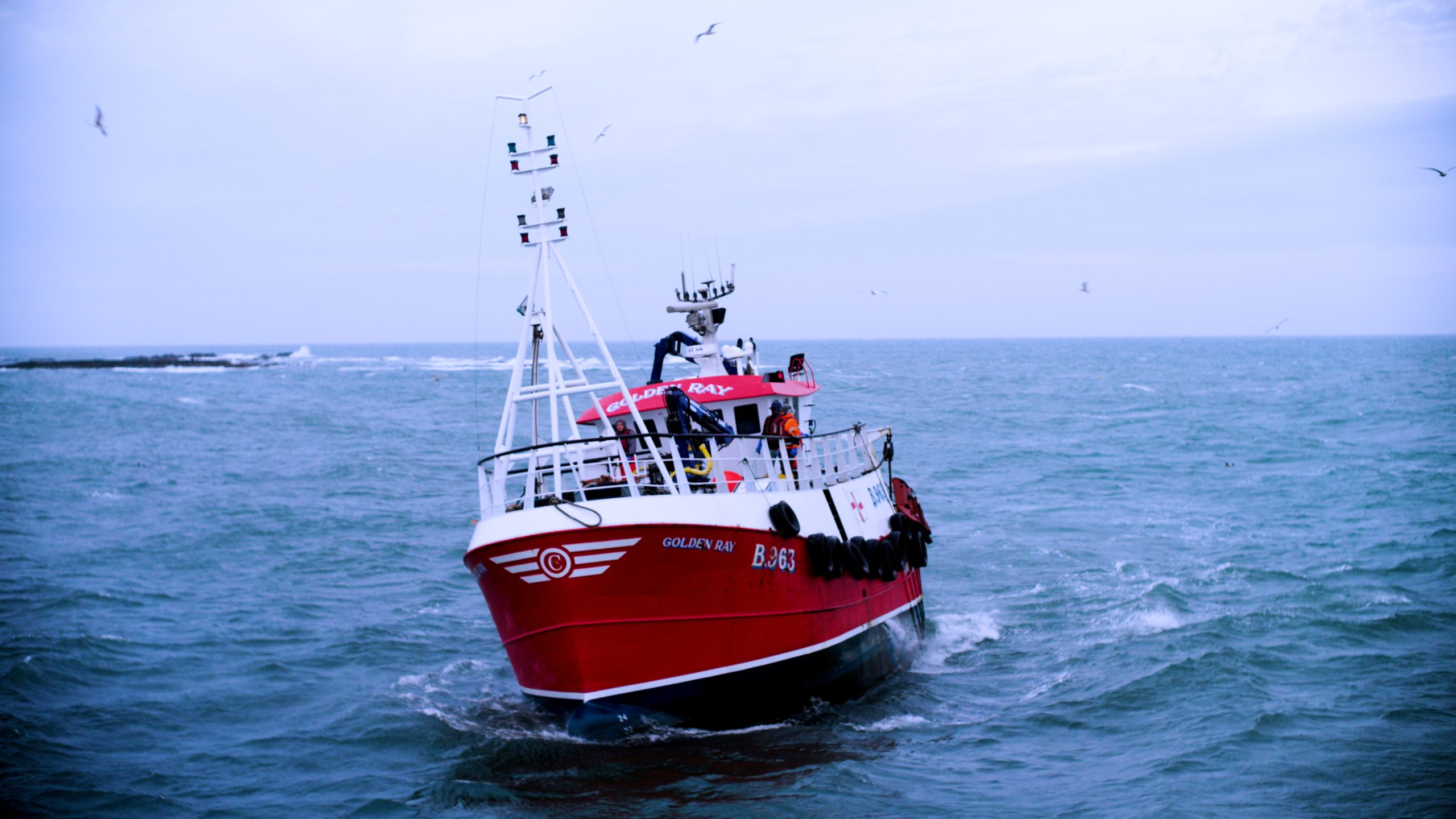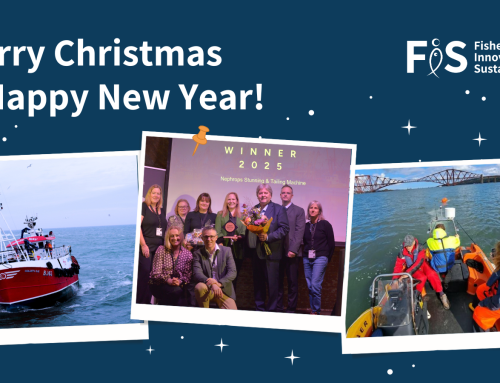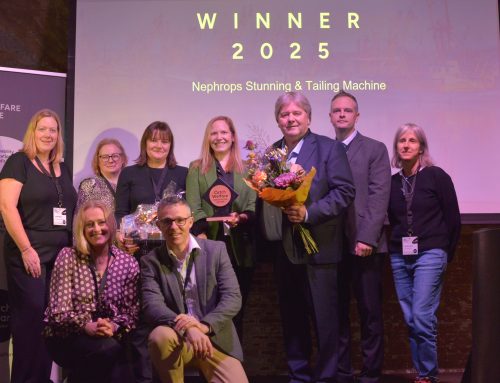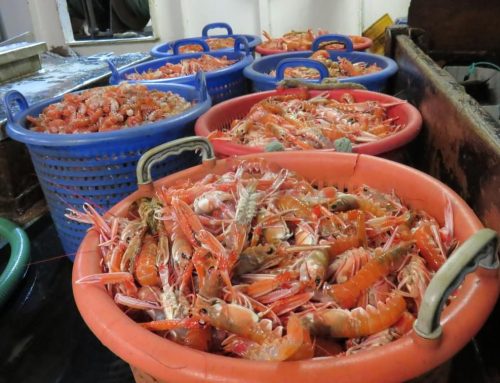A pioneering project led by Fisheries Innovation & Sustainability (FIS), and involving a unique coalition of seafood supply chain businesses, has secured funding from Northern Ireland’s Department of Agriculture, Environment and Rural Affairs (DAERA) to drive forward the next phase of development of its innovative prawn stunning and tailing machine, and position UK seafood supply chains to meet new market and regulatory requirements.
Awarded under the Marine Environment & Fisheries Fund, the £171,850 grant will improve the prototype machine to create a full-capacity, automated system which, following rigorous testing by seafood processing technology leaders Optimar, will undergo a next phase of sea trials in Spring 2026, and see onshore demonstrations in Kilkeel and at the Scottish Skipper Expo in Aberdeen.
The news coincides with recent international recognition for the efforts of the coalition by the Global Seafood Alliance, which has shortlisted the project for a Responsible Seafood Innovation Award. The winner of the award – which recognises individuals and organisations working to find solutions to the challenges facing seafood – will be announced at the Responsible Seafood Summit in Cartagena, Colombia in October.
Posing a significant workload onboard, Nephrops (prawns) are typically live-tailed at sea by crews. With considerable potential in terms of improved animal welfare and product handling, alongside reduced crew workloads, the prototype machine automatically stuns and tails prawns – offering a more humane and efficient alternative to manual live tailing across this important fishery.
Agriculture, Environment and Rural Affairs Minister Andrew Muir said, “Nephrops are the cornerstone of Northern Ireland’s fishing industry, in supporting jobs, sustaining coastal communities and contributing significantly to the Northern Ireland economy. I am delighted that my department is providing the multi-sectoral partnership with £171,850 to develop the current prototype machine into one that can be adapted, and proven as practical, for use within most of our Nephrops fleet.
“The machine will not only deliver more humane tailing of Nephrops at sea but will enhance crew welfare through a significant reduction in the very long hours spent on deck manually sorting and tailing Nephrops in often very challenging weather and working conditions. I applaud industry in coming together to resolve such matters through the introduction of new technology to address the process of Nephrops handling onboard which has not changed for decades.”
Skippered by third generation Portavogie-based fisherman Darren McClements, the current prototype machine – and its capacity to withstand at-sea conditions – was successfully trialled aboard the commercial prawn trawler the Golden Ray in May 2025, with funding from the UK Seafood Fund’s Fisheries and Seafood Scheme (FaSS) matched by FIS and its industry partners
Involving supply-chain-wide collaboration, partners on the project also include: the Anglo Northern Ireland Fish Producers’ Organisation (ANIFPO), the Northern Ireland Fish Producers’ Organisation (NIFPO), Scottish White Fish Producers’ Association (SWFPA), Associated Seafoods, Shrimp Welfare Project, Kilkeel Seafoods, Whitby Seafoods, Young’s Seafood, Macduff Shellfish, M&S, Sainsbury’s, Seafish, University of Stirling, and The Fishmongers’ Company.
Kara Brydson, Executive Director at Fisheries Innovation & Sustainability said, “This project demonstrates how precompetitive collaboration with industry can drive forward sustainable innovation in UK fishing. We are so grateful to all our partners for their commitment to this work, and to our funders for their support. This vital grant will bring us another step closer to creating a unique piece of kit that is truly fit-for-purpose for UK vessels, and help seafood businesses meet future requirements and sustainability goals.”
Administered by DAERA, the Marine Environment and Fisheries Fund is designed to support marine and fisheries activity, and help deliver against the aims and objectives of the Joint Fisheries Statement and Northern Ireland’s sustainability commitments.
Portavogie skipper Darren McClements said, “We are proud to be involved in this project and to support sea trials of this machine. This is about fishing better, and working together to find solutions that mean we can address sustainability and welfare challenges, provide the highest quality product for market, and also make life easier onboard for our crew, improving our business model. At sea testing is a crucial part of this – to work, solutions have to be practically designed to conditions at sea and working onboard a fishing vessel. We are very grateful to owners Whitby Seafoods for supplying the Golden Ray for trials, their support here has been instrumental.”
With past trials demonstrating the prototype’s durability and effectiveness in real fishing conditions, ultimately, the project aims to secure the sector’s readiness to meet future welfare requirements and sustainability goals.
Lars Giske Head of R&D at Optimar said, “Aligned with our mission at Optimar to create technological solutions that can future-ready seafood processing, we embarked on this project with our partners two years ago with a shared mission to design and test the first onboard Nephrops stunning and tailing machine, and bring this from concept to a practical, sea-ready solution. With this now in reach, we look forward to the next phase of testing and development for broader adoption across the UK’s fleet.”
The development of the Nephrops Prototype Machine came as a proactive supply chain response to improve labour conditions and animal welfare in the fishery, bringing benefits to the entire sector.
To learn more about FIS and the project visit: https://fisorg.uk/nephrops-prototype-machine/






